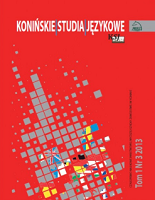A dynamic model of EFL learners’ enjoyment, resilience, anxiety, and language achievement
A dynamic model of EFL learners’ enjoyment, resilience, anxiety, and language achievement
Author(s): Maryam Majidi Yazdi, Afsaneh Ghanizadeh, Sepideh Mirzaee, Akram HosseiniSubject(s): Foreign languages learning
Published by: Akademia Nauk Stosowanych w Koninie
Keywords: anxiety; EFL learners; enjoyment; language achievement; resilience;
Summary/Abstract: This study investigated the relationships between English as a foreign lan- guage (EFL) learners’ enjoyment, resilience, anxiety and language achievement by proposing a structural equation modeling (SEM). To achieve this aim, 201 EFL students studying in a university (N = 156) and a private institute (N = 45) were asked to participate in a survey and complete three questionnaires. The first questionnaire was the Foreign Language Enjoyment Scale. It includes 11 items and 3 factors (i.e., FLE-Private, FLE-Teacher, and FLE-Atmosphere) and was validated by Li, et al. (2018). The questionnaire for measuring resilience de- signed and validated by Kim and Kim (2016) was employed. The instrument contains five sub-factors and has 26 items. The sub-factors include: perceived happiness, empathy, sociability, persistence, and self-regulation. The scale was translated to Persian and validated by Najafzadeh et al. (2018). To meas- ure L2 anxiety, six items from Dörnyei’s L2 Motivational Self System (2005), translated into Persian and validated by Papi (2009), were used. The findings estimated via SEM indicated that L2 enjoyment can influence anxiety nega- tively and the other two variables positively. The highest correlation was de- tected between enjoyment and anxiety, followed by language achievement and resilience. The results also showed that anxiety can have a negative effect on resilience and language achievement.
Journal: Konińskie Studia Językowe
- Issue Year: 10/2022
- Issue No: 4
- Page Range: 341-357
- Page Count: 17
- Language: English

